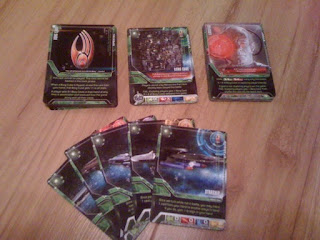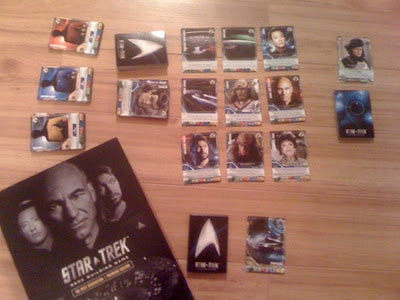So, I was a bit of a Trekkie as a kid (I know, you're shocked that someone with a blog about board games was a Trekkie), so when I heard about the Star Trek: The Next Generation Deck Building Game, I was immediately quite interested.
In Star Trek, you start the game with a handful of faceless officers (literally), and a couple of standard maneuvers and setup cards. Each turn, you are able to play the faceless officers to gain XP, which you spend to recruit better personnel, learn improved manuevers, and gain extra setup items. At any given time, a player will have nine different cards available to choose from when spending his XP. However, once per turn, a player may "search" for better cards by discarding one of these nine cards and replacing it with a new card from the draw pile. In addition to buying cards and searching, a player may play any setup and/or maneuver cards from his hand, and he may go exploring (this is, after all, a Star Trek game). When exploring, the active player flips a card from the top of the explore pile and attempts to resolve the appropriate mission. This is where mission (victory) points can be earned. This is also how better flagships can be acquired (stolen?), and where wars can begin. Players continue taking turns until one person has successfully gained 400 mission (victory) points.
So, for the most part, I don't care about themes in games. I'm just as happy playing Puerto Rico and Ra as I am with most any other game, even though settling the new world and pleasing the Pharaoh aren't necessarily things that I find interesting. However, occasionally a theme is interesting enough to me to warrant playing a game. Ahem, playing a good game. (Read, "not Stargate SG-1!"). Whereas this Star Trek game isn't quite Battlestar Galactica good, it is good enough that it being Star Trek themed adds to my enjoyment of it.
The next thing that I like about the Star Trek DBG (Deck Building Game) is that it has found a happy mix between the reactionary elements of deck building that can be found in Ascension: Chronicle Of The Godslayer, and the more planning-friendly elements of Dominion (man, that's a lot of links). In Ascension, I felt like I wasn't really able to plan at all because the cards in the middle would all be gone before it was ever my turn. In Dominion, whatever was available was always available. Star Trek finds a nice balance between these two extremes. Sure, you must work with what is available; however, with the ability to search, this doesn't seem like a hindrance. Plus, since most players will not be able to remove more then two or three cards from the available selection, a player will be able to at least partially plan on what cards he would like to purchase on his turn.
 |
| Special Borg scenario cards |
The final pro that I will mention about Star Trek is that I really liked how they implemented XP in the game. Honestly, I like this both in the art of the cards and the game mechanics of it. I like that your characters that are "building block" characters are generic faceless officers. I don't know why - it just feels right. At the same time, I like that these officers are primarily valuable for their XP but can also be helpful in missions. The Ensigns and Lieutenants both add one statistic, and Commanders add two. This means that you have two different reasons to try to upgrade your low level officers to Commanders. Plus, with the fact that each starting deck has "Starfleet Academy" (a card that lets you upgrade a character card to a better character card), you feel like you are making progress as your low-level XP cards turn into better XP cards, and eventually into our well known characters.
However, with all that Star Trek DBG did right, it is definitely not perfect....
 |
| "Raise Sheilds!" |
Next (and probably more important for the actual play of the game) is that I felt like the scenarios were a bit unfinished. It feels like they spent quite a bit of time developing the exploration decks for the scenarios, but then they neglected making sure that the cards you used to build your deck worked correctly in them. For example, several of the characters abilities allow you to interact with your "opponents," and are costed in XP accordingly. However, in the Borg scenario, you do not have "opponents," as you are all playing against the game. Therefore, these card abilities are suddenly useless (so those characters are just horribly overpriced). And, what's more, they expect you to just assume that this is how the cards work. After looking through the instructions, the FAQ in the back, and even going to their site, I was forced to post my question about "who is my opponent in the Borg scenario" on their forums before I was able to get a very definitive answer. I counted, and approximately 10-15 cards cannot use their game text in the Borg scenario, but are still costed as if they could.
The next problem with the game is that it lasts a bit longer than it feels like it should. You could also state this as the game seems to drag at times. In the exploration scenario, this could be remedied by changing the starting decks to include a Commander in place of one of the Ensigns, or something similar, to speed up the game. However, this kind of adjustment would break the balance in the Borg scenario. Specifically, in the Borg scenario, you are at the game's (and destiny's) mercy as to how long the game will last. The game lasts until you are able to defeat the Locutus mission. Of course, to defeat it, you must first draw it! Therefore, you may spend a lot of the game in a state where you are able to win if you could only draw the end of game card. This can be a bit frustrating.
The next thing that I'm going to list as a "con", but that could also be a point of note is that flagships seem a bit overpowered. Now, with this said, I really like the flagships in the game. How this works is that each player starts with a pitiful flagship with a defense (hull) value, and no other statistics. However, when exploring, you may encounter other ships. If, when doing so, you have the Speed to avoid getting shot, while having the Diplomacy (Gold Pressed Latinum) to convince them to join you, then you can use the new ship as your flagship. From there, you have improved statistics for the rest of the game. If I am able to get the USS Enterprise as my flagship, and you are only ever able to recruit a Scout Ship, I will have a significant advantage against almost every card in the encounter deck and will have a major advantage if we go to war. Whereas I think that it is really awesome that you can get new flagships as the game goes along, I think that the flagships should have had a value for when a player is attempting to recruit or battle it and a different value for when a player is using it as his flagship. This would help alleviate some of the imbalance that I felt here.
Overall, I give Star Trek: The Next Generation Deck Building Game an 8.0/10. Sure, it's not perfect, but I enjoyed it. If you enjoy deck building games and are a Star Trek fan, don't worry. This game is good enough that you won't be too annoyed that they used the license here (again looking at you Stargate...). I recommend checking it out, and I recommend that you don't neglect the alternative scenarios - the Borg scenario (since we are all able to play at the same time) is my favorite way to play; it is able to keep everyone engaged and minimize on the drag that the game can encounter.
If you like deck building, you might also want to read about (aside from the Dominion and Ascension that I linked to earlier) Thunderstone: Dragonspire (which I recommend above the standard Thunderstone). Or, if you enjoy sci-fi, then you might try the Star Wars X-Wing Minis Game, or the Star Wars living card game.







